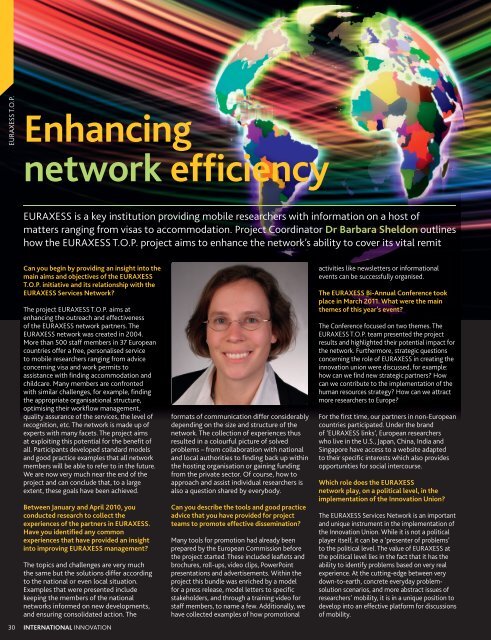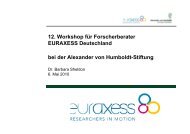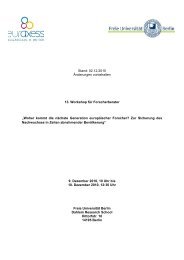International Innovation
International Innovation
International Innovation
You also want an ePaper? Increase the reach of your titles
YUMPU automatically turns print PDFs into web optimized ePapers that Google loves.
EURAXESS T.O.P.<br />
Enhancing<br />
network efficiency<br />
EURAXESS is a key institution providing mobile researchers with information on a host of<br />
matters ranging from visas to accommodation. Project Coordinator Dr Barbara Sheldon outlines<br />
how the EURAXESS T.O.P. project aims to enhance the network’s ability to cover its vital remit<br />
Can you begin by providing an insight into the<br />
main aims and objectives of the EURAXESS<br />
T.O.P. initiative and its relationship with the<br />
EURAXESS Services Network<br />
The project EURAXESS T.O.P. aims at<br />
enhancing the outreach and effectiveness<br />
of the EURAXESS network partners. The<br />
EURAXESS network was created in 2004.<br />
More than 500 staff members in 37 European<br />
countries offer a free, personalised service<br />
to mobile researchers ranging from advice<br />
concerning visa and work permits to<br />
assistance with finding accommodation and<br />
childcare. Many members are confronted<br />
with similar challenges, for example, finding<br />
the appropriate organisational structure,<br />
optimising their workflow management,<br />
quality assurance of the services, the level of<br />
recognition, etc. The network is made up of<br />
experts with many facets. The project aims<br />
at exploiting this potential for the benefit of<br />
all. Participants developed standard models<br />
and good practice examples that all network<br />
members will be able to refer to in the future.<br />
We are now very much near the end of the<br />
project and can conclude that, to a large<br />
extent, these goals have been achieved.<br />
Between January and April 2010, you<br />
conducted research to collect the<br />
experiences of the partners in EURAXESS.<br />
Have you identified any common<br />
experiences that have provided an insight<br />
into improving EURAXESS management<br />
The topics and challenges are very much<br />
the same but the solutions differ according<br />
to the national or even local situation.<br />
Examples that were presented include<br />
keeping the members of the national<br />
networks informed on new developments,<br />
and ensuring consolidated action. The<br />
30 INTERNATIONAL INNOVATION<br />
formats of communication differ considerably<br />
depending on the size and structure of the<br />
network. The collection of experiences thus<br />
resulted in a colourful picture of solved<br />
problems – from collaboration with national<br />
and local authorities to finding back up within<br />
the hosting organisation or gaining funding<br />
from the private sector. Of course, how to<br />
approach and assist individual researchers is<br />
also a question shared by everybody.<br />
Can you describe the tools and good practice<br />
advice that you have provided for project<br />
teams to promote effective dissemination<br />
Many tools for promotion had already been<br />
prepared by the European Commission before<br />
the project started. These included leaflets and<br />
brochures, roll-ups, video clips, PowerPoint<br />
presentations and advertisements. Within the<br />
project this bundle was enriched by a model<br />
for a press release, model letters to specific<br />
stakeholders, and through a training video for<br />
staff members, to name a few. Additionally, we<br />
have collected examples of how promotional<br />
activities like newsletters or informational<br />
events can be successfully organised.<br />
The EURAXESS Bi-Annual Conference took<br />
place in March 2011. What were the main<br />
themes of this year’s event<br />
The Conference focused on two themes. The<br />
EURAXESS T.O.P. team presented the project<br />
results and highlighted their potential impact for<br />
the network. Furthermore, strategic questions<br />
concerning the role of EURAXESS in creating the<br />
innovation union were discussed, for example:<br />
how can we find new strategic partners How<br />
can we contribute to the implementation of the<br />
human resources strategy How can we attract<br />
more researchers to Europe<br />
For the first time, our partners in non-European<br />
countries participated. Under the brand<br />
of ‘EURAXESS links’, European researchers<br />
who live in the U.S., Japan, China, India and<br />
Singapore have access to a website adapted<br />
to their specific interests which also provides<br />
opportunities for social intercourse.<br />
Which role does the EURAXESS<br />
network play, on a political level, in the<br />
implementation of the <strong>Innovation</strong> Union<br />
The EURAXESS Services Network is an important<br />
and unique instrument in the implementation of<br />
the <strong>Innovation</strong> Union. While it is not a political<br />
player itself, it can be a ‘presenter of problems’<br />
to the political level. The value of EURAXESS at<br />
the political level lies in the fact that it has the<br />
ability to identify problems based on very real<br />
experience. At the cutting-edge between very<br />
down-to-earth, concrete everyday problemsolution<br />
scenarios, and more abstract issues of<br />
researchers’ mobility, it is in a unique position to<br />
develop into an effective platform for discussions<br />
of mobility.
EURAXESS T.O.P.<br />
T.O.P. results<br />
With the long-term view of developing the EURAXESS network to<br />
become the definitive point of reference for mobile researchers, the<br />
EURAXESS T.O.P. project is implementing a series of initiatives to<br />
improve staff training and the accessibility of information<br />
Workshops serve as a platform for:<br />
sharing expert knowledge (top),<br />
initiating transnational cooperation (middle),<br />
and understanding European policy (bottom).<br />
THE EURAXESS NETWORK is a key initiative<br />
supporting the EU’s commitment to removing<br />
barriers to free movement of knowledge within<br />
Europe. It strengthens cross-border mobility of<br />
researchers, students, scientists and academic<br />
staff and provides researchers with better<br />
career structures. The network operates a<br />
single access point to information across all<br />
countries and includes a network of walk-in<br />
centres offering personalised assistance to<br />
researchers moving to another country. Each<br />
of the network’s member countries has one or<br />
two Bridgehead Organisations (BHOs) which<br />
are responsible for the national websites and for<br />
coordinating the national networks, consisting<br />
of regional EURAXESS Services Centres (ESCs)<br />
and Local Contact Points (LoCPs). EURAXESS<br />
staff members across Europe are usually highly<br />
qualified and have demonstrated a high level<br />
of dedication to their mission. However, many<br />
BHOs are run with a minimum of staff, who<br />
are often responsible for a multitude of duties.<br />
It is important that they have access to reliable<br />
information and can benefit from the experience<br />
of senior staff members in other BHOs. It is to<br />
address these issues that the EURAXESS T.O.P. –<br />
‘Enhancing the Outreach and Effectiveness of the<br />
EURAXESS Network Partners’ project has been<br />
set up with the overall objective of monitoring<br />
and improving the current levels of quality,<br />
effectiveness and coherence of the services<br />
afforded by the EURAXESS Services Network.<br />
• Training of the network members according to<br />
their specific needs<br />
THE PORTAL CALL<br />
The EURAXESS clientele, particularly mobile<br />
researchers, require easy access to relevant<br />
information about anywhere they wish to<br />
travel to or from. Therefore, the EURAXESS<br />
task team developed a set of 15 compulsory<br />
criteria that all national websites are obliged<br />
to fulfil by the end of the project. The portal<br />
call provided the BHOs with money to enable<br />
the realisation of this goal. 34 countries<br />
submitted applications and after an evaluation<br />
process, all of which were approved. Now, the<br />
national websites have a similar structure and<br />
design, use reliable IT tools, can cope with<br />
the same bunch of topics and regularly keep<br />
their contents up-to-date. All applicants were<br />
required to commit to promotional activities<br />
centred around the portals with particular<br />
attention on the EURAXESS jobs portal.<br />
Dissemination is a key element of the process,<br />
as Project Coordinator Dr Barbara Sheldon<br />
details: “There are still too many researchers<br />
who are not familiar with this ‘one-stopshop’<br />
for all topics around mobility, and the<br />
opportunities that the jobs portal offers. These<br />
include free job advertising for employers, and<br />
free upload of CVs for researchers searching<br />
for jobs”.<br />
THREE POINTS OF FOCUS<br />
The EURAXESS T.O.P. team unites staff members<br />
from established BHOs in 11 European countries.<br />
Each partner is responsible for the coordination<br />
of at least one sub-project, which is carried out by<br />
five to 20 task members each. The consortium has<br />
been assisted by most of the other BHOs who did<br />
not take a lead in a task, but instead committed<br />
themselves to contribute their expertise as<br />
associated partners. To fulfil the overall objective,<br />
the project focuses on three main activities:<br />
• The launch and follow-up of a ‘portal call’,<br />
providing BHOs with funds for improving the<br />
contents and structure of their national portals<br />
and for promoting the EURAXESS Jobs section<br />
• Developing an electronic handbook. In the<br />
future, this will serve as a manual on how to<br />
design and run a EURAXESS Services Centre<br />
(ESC). The core components are a collection<br />
of best practices and checklists for quality<br />
management issues<br />
ELECTRONIC HANDBOOK<br />
The work carried out in all tasks, including<br />
related feedback collected during the workshops,<br />
has been compiled in an electronic handbook.<br />
Confronted with challenges in their daily work,<br />
staff members on all levels of the network will<br />
be supported, either in finding solutions directly,<br />
or in identifying people whom they can ask for<br />
advice in their particular situation. Owing to<br />
the electronic manual, network members can<br />
now search for the best way to deal with many<br />
situations and they will find colleagues with<br />
the necessary experience. The handbook also<br />
contains tools for quality assurance, such as<br />
assessment forms, references to literature, and<br />
texts that they can use for promotional purposes<br />
or to address specific stakeholder groups.<br />
WORKSHOPS AND TRAINING<br />
The two workshops in the project were<br />
based on the assumption that experienced<br />
EURAXESS staff members are expert enough<br />
WWW.RESEARCHMEDIA.EU 31
INTELLIGENCE<br />
EURAXESS T.O.P.<br />
ENHANCING THE OUTREACH AND<br />
EFFECTIVENESS OF THE PARTNERS IN<br />
THE EURAXESS SERVICES NETWORK<br />
OBJECTIVES<br />
The project is geared towards reinforcing<br />
the quality, effectiveness and coherence<br />
of the services afforded by the EURAXESS<br />
Services Network. This will be achieved<br />
by promoting transnational cooperation<br />
along with identification, refinement and<br />
exchange of best practice. The network assists<br />
mobile researchers by providing information<br />
and tailored assistance, and enhances the<br />
attractiveness of the European Research Area.<br />
KEY COLLABORATORS<br />
Alexander von Humboldt Foundation<br />
(coordinating institution), Germany • Sofia<br />
University, NIS, Bulgaria • Archimedes<br />
Foundation, Estonia • CPU/CLORA (Conférence<br />
des Présidents d’Université/Club des Organismes<br />
de Recherche Associés), France • Centre for<br />
Research and Technology Hellas, Greece •<br />
TeT - Hungarian Science and Technology<br />
Foundation (Tudományos és Technológiai<br />
Alapítvány), Hungary • Irish Universities<br />
Association, Ireland • Research Authority, BIU<br />
(Bar Ilan University), Israel • Research Council<br />
of Norway, Norway • FundaciÓn Española<br />
para la Ciencia y la TecnologÍa, Spain •<br />
VINNOVA (The Swedish Governmental Agency<br />
for <strong>Innovation</strong> Systems), Sweden<br />
FUNDING<br />
EU Seventh Framework Programme (FP7),<br />
project number 249143<br />
CONTACT<br />
Regina Basse<br />
Alexander von Humboldt Foundation<br />
Jean-Paul-Str 12<br />
D-53173 Bonn<br />
Germany<br />
T +49 228 833 415<br />
F +49 228 833 114<br />
E regina.basse@avh.de<br />
at their own jobs to enable them to act as<br />
trainers for less experienced colleagues. The<br />
first workshop was tailored for BHOs and<br />
focused on the rationale of the network;<br />
it functioned both within and beyond the<br />
network, and was deemed successful by all<br />
participants. The second workshop – for ESCs<br />
and LoCPs – built on this experience and trained<br />
participants in EU human resources policy, EU<br />
researcher mobility funding, interaction with<br />
the private sector, and quality management<br />
tools. Additional formats were introduced,<br />
including a marketplace where all participants<br />
were invited to present a project or initiative<br />
of their choice. The methods used to create<br />
the workshops proved highly successful. “The<br />
concept of the workshops accounted for the<br />
expertise of the network partners and therefore<br />
offered opportunities for presenting and<br />
exchanging best practice, as well as enabling<br />
the participants to find interesting partners<br />
for future collaboration,” Sheldon reflects. An<br />
additional training video is due to be prepared,<br />
which will provide an informative and<br />
accessible introduction to all fields of activity<br />
of EURAXESS. It will specifically address new<br />
and relatively inexperienced staff members all<br />
over Europe.<br />
PHASE TWO<br />
EURAXESS T.O.P. has been supported by<br />
funding from the EU Seventh Framework<br />
Programme (FP7) with the current phase set<br />
to conclude in June 2011. The full extent of<br />
the impact on each partner and the network<br />
as a whole will only be visible in the future;<br />
however, to date, the project has been very<br />
successful in achieving its objectives, as<br />
Sheldon testifies: “The network has been<br />
strengthened considerably, for example, by<br />
developing quality standards in several fields of<br />
activity”. The last fine-tuning activities for the<br />
websites and handbook are underway.<br />
Consortium members have also given positive<br />
feedback on the strong individual benefits<br />
they have gained from being able to work with<br />
many different partners. For example, one BHO,<br />
motivated by the style used in another country,<br />
changed its structure. As a result, responsibilities<br />
became more transparent, decision procedures<br />
more efficient and the job satisfaction of staff<br />
members increased.<br />
With the current enhancement project drawing<br />
to a close, Sheldon is clear about the next phase:<br />
“We will do our very best to continue the process<br />
that started with our project, combining our<br />
forces for the removal of obstacles to researcher<br />
mobility”. With this aim in mind, a new project<br />
team has already put forward an application for<br />
EURAXESS T.O.P. II funding. If the Commission<br />
takes a positive decision, the new consortium<br />
will look at enhancing the transnational<br />
cooperation within the network, with a view<br />
to establishing the EURAXESS brand as the<br />
authoritative source of information, related to<br />
mobility, at the disposal of researchers within<br />
and beyond Europe.<br />
BARBARA SHELDON, PhD, is Head of the<br />
‘Researcher Mobility and EURAXESS Germany’<br />
division of the Alexander von Humboldt<br />
Foundation, where she has held a number of<br />
different positions. Before that, she worked for<br />
the German Academic Exchange Service (DAAD)<br />
and the University of Heidelberg. She holds a<br />
PhD from the University of Erlangen in Germany<br />
and an MA from the University of Kansas, USA.<br />
THE EURAXESS T.O.P. TEAM AT THE KICK-OFF MEETING IN BONN/GERMANY<br />
Front row from left to right: Regina Basse (project manager, AvH), Julia Sieben (programme officer, AvH), Natalie<br />
Gordon (project officer, BIU), Swetlana Dimitrova (task leader, SU-NIS), Elin Kollerud (task leader, RCN), Cristina<br />
Gomez (work package leader, FECYT), Barbara Sheldon (coordinator).<br />
Back row from left to right: Ruth Klausmann-Tombers (assistant to project manager, AvH), Hans Borchgrevink<br />
(steering group, RCN), Stefanie Eckstein (portal manager, AvH), Agnes Smolenszky (task leader, TETALAP), Conor<br />
O’Carroll (steering group, IUA), Cecilia Cabello (steering group, FECYT), Adam Molnar (project officer, TETALAP),<br />
Magdalena Wislocka (project officer, IUA), Eva Carnestedt (task leader, VINNOVA), Kristin Kraav (task leader,<br />
Archimedes), Ulrike Albrecht (steering group, AvH), Dimitris Sanopoulos (work package leader, CERTH), Isser Peer (task<br />
leader, BIU), Jean-François Huon (task leader, CPU/CLORA).<br />
32 INTERNATIONAL INNOVATION





